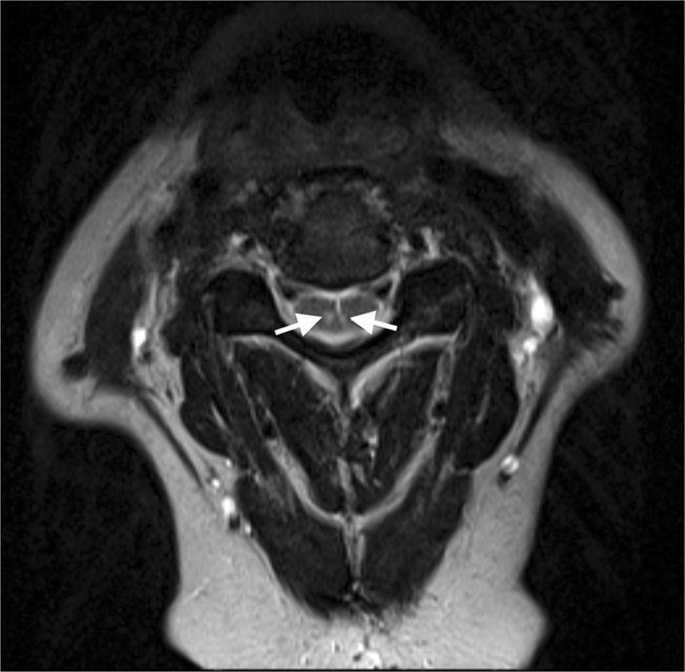当前位置:
X-MOL 学术
›
Spinal Cord Ser. Cases
›
论文详情
Our official English website, www.x-mol.net, welcomes your feedback! (Note: you will need to create a separate account there.)
Copper deficiency related myelopathy 40 years following a jejunoileal bypass.
Spinal Cord Series and Cases Pub Date : 2019-12-16 , DOI: 10.1038/s41394-019-0249-x Shawn Joshi 1, 2 , Mitra McLarney 3 , Benjamin Abramoff 3
Spinal Cord Series and Cases Pub Date : 2019-12-16 , DOI: 10.1038/s41394-019-0249-x Shawn Joshi 1, 2 , Mitra McLarney 3 , Benjamin Abramoff 3
Affiliation

|
Introduction
Acquired copper deficiency myelopathy is a rare disorder associated with hematologic abnormalities, peripheral neuropathy, and sensory ataxia. Although its clinical presentation and radiographic findings are similar to other nutrient deficiencies, practitioners often fail to diagnose copper deficiency. This report describes a case of copper deficiency decades after a jejunoileal bypass (JIB) to draw attention to potential long-term sequelae associated with this now abandoned procedure.
Case presentation
A 67-year-old female presented with bilateral paresthesias of her hands and legs, accompanied by gait instability and frequent falls. The individual had a significant history of malabsorption and malnutrition related to a 40 years prior JIB for weight loss. MRI demonstrated T2 hyperintense signal in the dorsal spinal cord between C3 and C5. She was found to have copper deficiency, underwent IV repletion, prescribed oral repletion, and was discharged home. She subsequently developed progressive symptoms over the following year and remained unable to function at home. Treatment required inpatient copper repletion followed by inpatient rehabilitation. Following rehabilitation, the individual demonstrated significant improved independence.
Discussion
Although JIB surgery is not currently performed, it is important to recognize the metabolic consequences of nutrient deficiencies related to this procedure and the potential for the development of neurological sequelae including myelopathy. Furthermore, additional causes of copper deficiency to consider in cases of undifferentiated myelopathy include congenital metabolic syndromes, zinc toxicity, and malabsorption. This case demonstrates the potential of intensive physical and occupational therapy regimens, along with symptomatic treatment and nutrient repletion, to help an individual regain independence and improve activities of daily living.
中文翻译:

空肠绕道术后 40 年出现铜缺乏相关的脊髓病。
简介 获得性铜缺乏症脊髓病是一种罕见疾病,与血液学异常、周围神经病变和感觉性共济失调有关。尽管其临床表现和放射学检查结果与其他营养缺乏症相似,但医生常常无法诊断铜缺乏症。本报告描述了空肠绕道手术 (JIB) 几十年后出现铜缺乏的病例,以引起人们对与这一现已废弃的手术相关的潜在长期后遗症的关注。病例介绍 一名 67 岁女性,出现双侧手脚感觉异常,伴有步态不稳、经常跌倒。该人有明显的吸收不良和营养不良病史,与 40 年前因减肥而进行的 JIB 相关。MRI 显示 C3 和 C5 之间的背侧脊髓存在 T2 高信号。她被发现患有铜缺乏症,接受了静脉补充,处方口服补充,并出院回家。随后,她在接下来的一年中出现了进行性症状,并且仍然无法在家中活动。治疗需要住院患者补充铜,然后进行住院康复。康复后,该人的独立性显着提高。讨论 尽管目前尚未进行 JIB 手术,但重要的是要认识到与该手术相关的营养缺乏的代谢后果以及发生神经系统后遗症(包括脊髓病)的可能性。此外,在未分化脊髓病的情况下,需要考虑的铜缺乏的其他原因包括先天性代谢综合征、锌中毒和吸收不良。该病例证明了强化物理和职业治疗方案以及对症治疗和营养补充的潜力,可以帮助个人重新获得独立并改善日常生活活动。
更新日期:2019-12-16
中文翻译:

空肠绕道术后 40 年出现铜缺乏相关的脊髓病。
简介 获得性铜缺乏症脊髓病是一种罕见疾病,与血液学异常、周围神经病变和感觉性共济失调有关。尽管其临床表现和放射学检查结果与其他营养缺乏症相似,但医生常常无法诊断铜缺乏症。本报告描述了空肠绕道手术 (JIB) 几十年后出现铜缺乏的病例,以引起人们对与这一现已废弃的手术相关的潜在长期后遗症的关注。病例介绍 一名 67 岁女性,出现双侧手脚感觉异常,伴有步态不稳、经常跌倒。该人有明显的吸收不良和营养不良病史,与 40 年前因减肥而进行的 JIB 相关。MRI 显示 C3 和 C5 之间的背侧脊髓存在 T2 高信号。她被发现患有铜缺乏症,接受了静脉补充,处方口服补充,并出院回家。随后,她在接下来的一年中出现了进行性症状,并且仍然无法在家中活动。治疗需要住院患者补充铜,然后进行住院康复。康复后,该人的独立性显着提高。讨论 尽管目前尚未进行 JIB 手术,但重要的是要认识到与该手术相关的营养缺乏的代谢后果以及发生神经系统后遗症(包括脊髓病)的可能性。此外,在未分化脊髓病的情况下,需要考虑的铜缺乏的其他原因包括先天性代谢综合征、锌中毒和吸收不良。该病例证明了强化物理和职业治疗方案以及对症治疗和营养补充的潜力,可以帮助个人重新获得独立并改善日常生活活动。


























 京公网安备 11010802027423号
京公网安备 11010802027423号